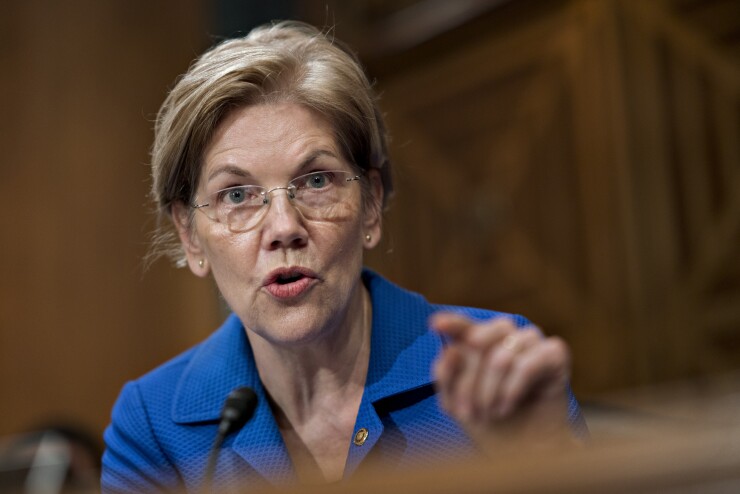WASHINGTON — Sen. Elizabeth Warren, D-Mass., introduced a bill Wednesday that would create a permanent law enforcement unit to investigate potential criminal activity at large financial institutions.
The move by Warren was in stark contrast to the bipartisan legislation to roll back certain provisions of the Dodd-Frank Act, which is expected to pass the Senate on Thursday morning.
Warren, who opposes the relief bill — which she and other critics have nicknamed the Bank Lobbyist Act — said the 10th anniversary of the financial crisis was not an occasion to weaken bank regulatory rules. Her bill, the Ending Too Big to Jail Act, was introduced 10 years to the day of the government's bailout of Bear Stearns.

"When Wall Street CEOs break the law, they should go to jail like anyone else. The fraud on Wall Street won't stop until executives know they will be hauled out in handcuffs for cheating their customers and clients," Warren said in a press release. "Instead of passing the Bank Lobbyist Act, Congress should be marking the 10th anniversary of the financial crisis by strengthening rules on banks and bankers so Wall Street can never again get away with cheating Americans and crashing the economy."
Warren's bill would reconstitute a special watchdog created at the height of the crisis to help oversee the government's bailout of financial institutions. The Special Inspector General for the Troubled Asset Relief Program — or Sigtarp — would be renamed as the Special Inspector General for Financial Institution Crime, and would have a broader jurisdiction.
"The bill gives SIGFIC jurisdiction to investigate criminal activity in national financial institutions and exclusive authority to conduct material loss reviews following the failure of a financial institution," according to a one-page summary of the bill.
The bill would require annual certification by executives at banks above $10 billion in assets that due diligence has revealed no criminal activity or civil fraud at their institution. The legislation would also require judicial oversight of deferred prosecution agreements between banks and the Justice Department.
"When considering approval of a DPA, courts would have to make a determination that the agreement is in the 'public interest' by considering whether it will deter future similar conduct and whether it sufficiently redresses past harms," according to the bill summary.





